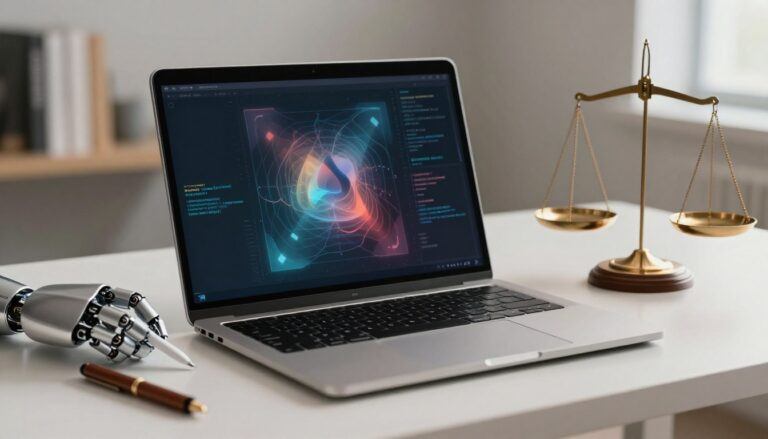
AI Content Copyright: What You Need to Know (and What I’ve Learned the Hard Way)
I’ll be honest with you, when I first started using AI tools to create blog content, I didn’t think twice about copyright.
If the output looked good, I hit the publish button.
Then I found out how gray this area really is.
Between AI text, images, and even music, the rules on who actually owns what you create with AI are still being written.
Here’s what I’ve learned through my own experience, and what you need to know if you’re using AI tools for your business or blog.
My Experience: When “AI Help” Got Messy
I remember the first time I used AI to draft a post.
I cleaned it up, added my story, and thought, “That’s mine.”
A week later, a friend asked if the AI could “own” part of it.
That question sent me down a rabbit hole of court rulings and copyright filings.
Turns out, the U.S. Copyright Office only protects content created by humans.
If your post is 100% machine-generated, you can’t claim full ownership.
But if you add your original structure, examples, edits, and ideas, then that’s your authorship.
That’s precisely what I do now with tools like RightBlogger.
It helps me brainstorm, outline, and speed up the writing process, but I ensure that every story, lesson, and example originates from me.
The Lesson: What the Law Says (and Real Cases)
A few major cases have already shaped this conversation:
- Thaler v. Perlmutter (2023)
Stephen Thaler attempted to register an image created entirely by his AI system, “Creativity Machine.”
The Copyright Office said no. The court backed that up, saying, No human authorship, no protection. - Getty Images v. Stability AI (2023–ongoing)
Getty sued Stability AI for using millions of its licensed photos to train Stable Diffusion.
The outcome could decide how “training data” is treated legally in the future. - Zarya of the Dawn (2023)
A comic book creator used Midjourney for illustrations.
The Copyright Office granted protection for the story and layout, but not the AI-generated art.
The big takeaway:
You can’t copyright what an AI creates by itself — but you can copyright your arrangement, selection, and human creativity that turns it into something original.
How You Can Apply This
If you’re creating with AI, protect your work like this:
- Add your voice. Don’t post raw AI output. Edit it, rewrite it, personalize it.
- Keep drafts. Save your process to show your human input if it’s ever questioned.
- Credit properly. If you use public data, stock photos, or prompts from others, be sure to cite them.
- Use trusted tools. I use RightBlogger because it keeps my workflow private and helps me write faster without losing my originality.
The best rule?
AI should assist, not replace, your creativity. Be yourself and add your own content to the AI-generated content you receive.
AI Content Copyright FAQs
Can AI-generated content be copyrighted?
No, not on its own. U.S. law only protects works with human authorship. You can, however, copyright your edits, structure, and commentary built around AI text or images.
Do I own content made with ChatGPT or RightBlogger?
You own your final version if you substantially edit or direct the output. The AI company doesn’t claim rights to your finished product, but the unedited raw output itself isn’t protected.
What if AI uses copyrighted material to train?
That’s under legal review. Getty vs. Stability AI and other ongoing cases will define whether using copyrighted data to train AI violates copyright law.
How can I protect my AI-assisted work?
Keep drafts showing your human input, register your work if it’s valuable, and make sure to personalize every piece. Documentation matters.
Is AI art treated differently from AI writing?
Not really. Both need clear human authorship to qualify. For example, Zarya of the Dawn was only protected for its human-written story, not its AI-generated art.
Ready to Create Ethically and Build Smart?
Learn how to grow an honest, sustainable online business using AI the right way. I’ll guide you inside Wealthy Affiliate — the same platform I use every day.
Join Me Inside Wealthy Affiliate



“The Lesson: What the Law Says (and Real Cases)” really clarified the current state of AI and copyright for me. The breakdown of real-world cases—especially Thaler v. Perlmutter and Zarya of the Dawn makes the abstract legal questions feel tangible and urgent. It’s a wake-up call for anyone casually using AI tools without understanding the implications. I appreciate how the author balances legal insights with practical advice, like saving drafts and documenting your creative input. Could there be future frameworks where creators can partially license or protect AI-assisted works, even if not fully human-authored?
Hello Ravin, You have asked a Great question!
“Could there be future frameworks where creators can partially license or protect AI-assisted works, even if not fully human-authored?”
Right now, the law still leans hard on “human authors only,” but things are shifting. Lawmakers and creators are already talking about ways to label or license AI-assisted work. It is a wait-and-see game to see how the current cases play out. We’re not there yet, but I think it’s coming.
Michael
This is one of the most clear-headed and practical FAQs I’ve read on this topic! I think the point you make about the ‘human authorship threshold’ being the critical factor is exactly right. It’s not about the tool, but the input, curation, and unique value a person adds. Your advice to treat AI as a collaborator and focus on adding substantial human effort is the perfect takeaway. I love how you cut through the legal uncertainty and give a solid, actionable framework for creators. Thank you for providing much-needed clarity and calming a lot of nerves!
Hey Cian, thanks for stopping by. This is a subject that is often overlooked until one day you are reading and see something you posted somewhere, it shouldn’t be there, and you wonder how it got there. Making AI-driven content your own is the only way to make it truly yours. Focusing on your knowledge and adding it to whatever AI gives you is the only way of making it unique and your property.
Michael